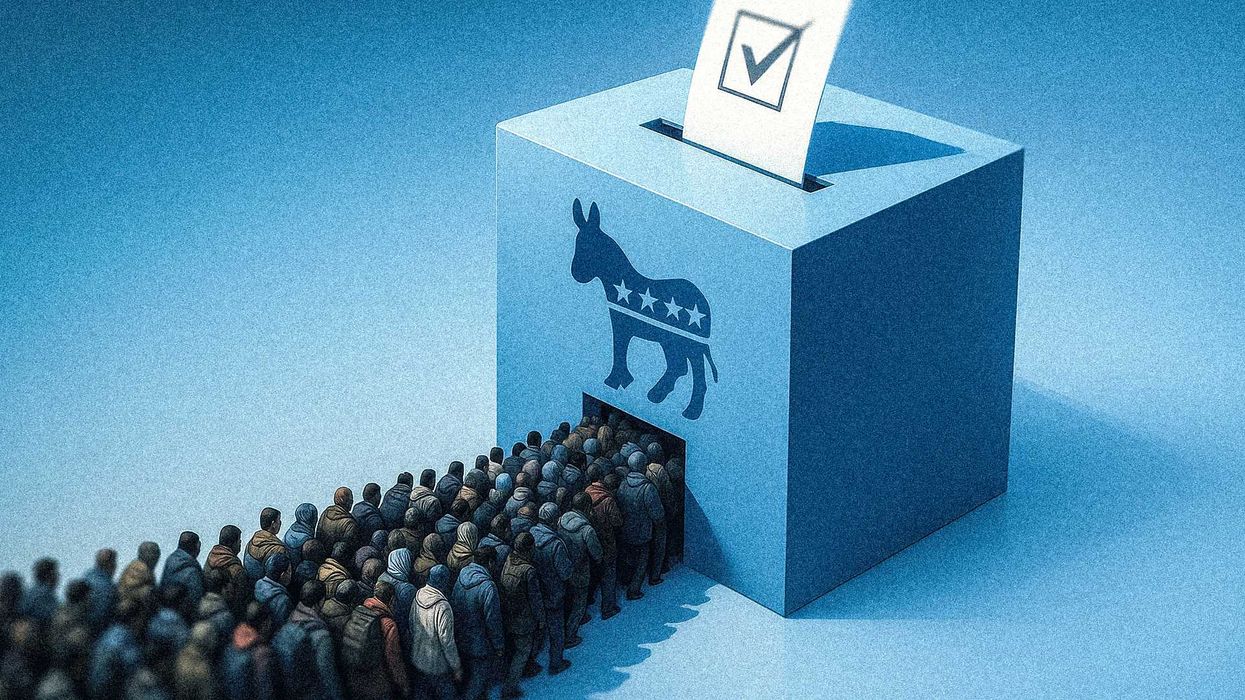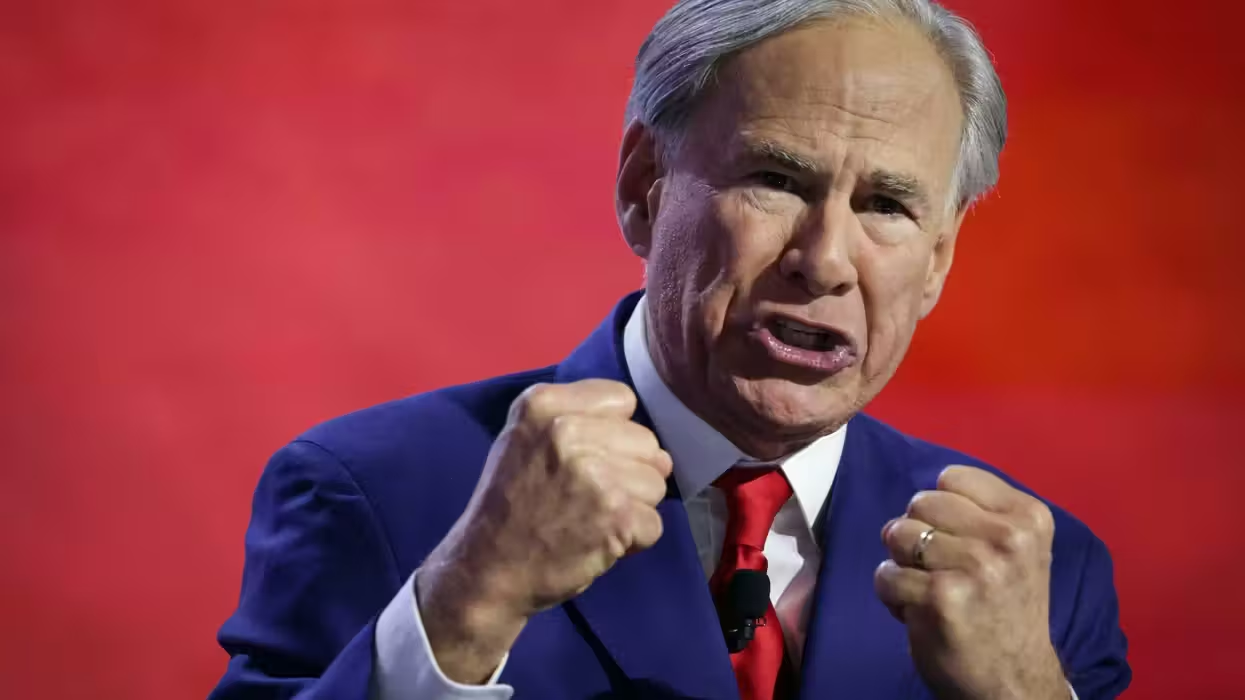
© 2025 Blaze Media LLC. All rights reserved.
"I'm here because the Liberal Democrats broke their promise."
LONDON (AP) — Police with riot shields held off angry student protesters marching to London's Parliament Square on Thursday as lawmakers debated a controversial plan to triple university tuition fees in England.
Thousands of students held demonstrations and sit-ins throughout the country, heaping pressure on the government to reverse course. Students marched through central London, banging drums, waving placards and chanting "education is not for sale," as weeks of nationwide protests reached a crescendo.
Small groups of protesters tore down barricades and threw paint bombs as police with batons fended off others in attempts to reinforce a security cordon near Parliament. Despite minor scuffles, the massive march remained largely peaceful.
 The tuition vote poses a crucial test for both the Conservative's governing coalition with the Liberal Democrats and the government's austerity plans to reduce Britain's budget deficit.
The tuition vote poses a crucial test for both the Conservative's governing coalition with the Liberal Democrats and the government's austerity plans to reduce Britain's budget deficit.
The vote put Deputy Prime Minister Nick Clegg and other Liberal Democrat leaders in an awkward spot. Liberal Democrats signed a pre-election pledge to oppose any such tuition hike, and have reserved the right to abstain in the vote even though they are part of the governing coalition proposing the change.
 Those protesting in central London were particularly incensed by what seems like a broken pledge by Clegg's party.
Those protesting in central London were particularly incensed by what seems like a broken pledge by Clegg's party.
"I'm here because the Liberal Democrats broke their promise," said 19-year-old Kings College student Shivan David from London's Trafalgar Square. "I don't think education should be free but I do think that tripling fees doesn't make any sense. We are paying more for less."
Inside the House of Commons and to the jeers from the opposition lawmakers, Business Secretary Vince Cable insisted Thursday that the new tuition plans were "progressive" as a heated debate over the proposal began.
While some Liberal Democrats — and even a few members of Prime Minister David Cameron's Conservative Party — have declared their opposition, the increase is still likely to pass.
"The real danger for the government is not that they won't pass it through, but that it will be a policy fiasco," said Patrick Dunleavy, a political science professor at the London School of Economics. "By picking this fight with the student body ... the government seems to have gotten itself into choppy water."

All of this has made Clegg one of the least popular politicians on university campuses. Protesters chanting "Nick Clegg, shame on you for turning blue" underscored the sense of betrayal, while the front page of the Daily Mirror newspaper called Clegg "the pathetic Pinocchio of politics."
The deputy prime minister defended his decision to support the proposals, saying the plans represent the "best possible choice" at a time of economic uncertainty.
"In the circumstances in which we face, where there isn't very much money around, where many millions of other people are being asked to make sacrifices, where many young people in the future want to go to university, we have to find the solution for all of that," Clegg told the BBC.

Cameron's government describes the move as a painful necessity to deal with a record budget deficit and a sputtering economy. To balance its books, the U.K. passed a four-year package of spending cuts worth 81 billion pounds ($128 billion), which will lead to the loss of hundreds of thousands of public sector jobs and cut or curtail hundreds of government programs.
The government proposed raising the maximum university tuition fees in England from 3,000 pounds (about $4,700) a year to 9,000 pounds (about $14,000). Students reacted with mass protests that have been marred by violence and have paralyzed some campuses.
In response, the government modified its plan by raising the income level at which graduates must start repaying student loans and by making more part-time students eligible for loans.

Students have said the concessions are not enough to lessen the blow of higher fees. They say that under the proposal, piles of debt will plague graduates and make a well-rounded education unattainable for many.
The controversy has highlighted regional educational differences in the United Kingdom.
The Welsh regional government has pledged to subsidize the higher fees for any student from Wales who enrolls at an English university. Student fees in Scotland are just 1,820 pounds ($2,875) per year, sparking fears of a future stampede of bargain-hunting students from England. Northern Ireland's fees are capped at 3,290 pounds ($5,200) a year.
___
AP writer Gillian Smith in London contributed to this story.
Want to leave a tip?
We answer to you. Help keep our content free of advertisers and big tech censorship by leaving a tip today.
Want to join the conversation?
Already a subscriber?
Jonathon M. Seidl is a former managing editor of Blaze News and a best-selling author and speaker. His next book, “Confessions of a Christian Alcoholic,” will be released on October 7, 2025.
Jonathon M. Seidl
Jonathon M. Seidl is a former managing editor of Blaze News and a best-selling author and speaker. His next book, “Confessions of a Christian Alcoholic,” will be released on October 7, 2025.
more stories
Sign up for the Blaze newsletter
By signing up, you agree to our Privacy Policy and Terms of Use, and agree to receive content that may sometimes include advertisements. You may opt out at any time.
Related Content
© 2025 Blaze Media LLC. All rights reserved.
Get the stories that matter most delivered directly to your inbox.
By signing up, you agree to our Privacy Policy and Terms of Use, and agree to receive content that may sometimes include advertisements. You may opt out at any time.






